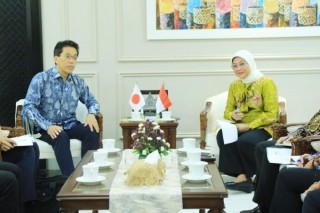Loading
Search
▼ Indonesia, Japan Discuss New Regulations For Migrant Workers
- Category:Other
Manpower Minister Ida Fauziyah met with Japanese Deputy Minister of State for Health, Labor, and Welfare Miyazaki Masahisa to discuss new employment regulations for foreign workers prepared by the Government of Japan.
"We welcome the new regulations for foreign workers in Japan. We hope these regulations can provide more protection and improve the welfare of our migrant workers in Japan," the minister noted in a statement from her office on Friday.
During the meeting on Friday, Masahisa ensured that PMIs in Japan would be able to continue their work in Japan.
"The Japanese government stated that the changes to the rules for foreign workers are not very significant. Our existing migrant workers in Japan can continue their work," Fauizyah remarked.
Earlier, Indonesia and Japan had implemented cooperation in the field of employment in several programs, including apprenticeships, through the Technical Intern Train Program (TITP) scheme that has been running since 1993.
In addition, cooperation between Indonesia and Japan is established in the form of the Indonesia-Japan Economic Partnership Agreement (IJEPA) that has been in force since July 1, 2008. Both nations have also established cooperation in worker placement through the Specified Skill Workers (SSW) program.
Based on the experience of ongoing cooperation, Fauziyah is upbeat that the Japanese Government would continue to intensify communication to support dissemination of the latest information regarding foreign worker regulations to Indonesia and other countries.
"With support from Minister Masahisa, cooperative relations between Indonesia and Japan, especially in the field of employment, will be improved and continue to develop," she remarked.
On April 24, the ministry's Secretary General, Anwar Sanusi, also called on Japanese employers to provide language training for skilled Indonesian workers, considering the high level of interest among them to work in Japan.
"We believe that the best protection for workers is to provide skills according to the needs in the destination country," he remarked.
"We welcome the new regulations for foreign workers in Japan. We hope these regulations can provide more protection and improve the welfare of our migrant workers in Japan," the minister noted in a statement from her office on Friday.
During the meeting on Friday, Masahisa ensured that PMIs in Japan would be able to continue their work in Japan.
"The Japanese government stated that the changes to the rules for foreign workers are not very significant. Our existing migrant workers in Japan can continue their work," Fauizyah remarked.
Earlier, Indonesia and Japan had implemented cooperation in the field of employment in several programs, including apprenticeships, through the Technical Intern Train Program (TITP) scheme that has been running since 1993.
In addition, cooperation between Indonesia and Japan is established in the form of the Indonesia-Japan Economic Partnership Agreement (IJEPA) that has been in force since July 1, 2008. Both nations have also established cooperation in worker placement through the Specified Skill Workers (SSW) program.
Based on the experience of ongoing cooperation, Fauziyah is upbeat that the Japanese Government would continue to intensify communication to support dissemination of the latest information regarding foreign worker regulations to Indonesia and other countries.
"With support from Minister Masahisa, cooperative relations between Indonesia and Japan, especially in the field of employment, will be improved and continue to develop," she remarked.
On April 24, the ministry's Secretary General, Anwar Sanusi, also called on Japanese employers to provide language training for skilled Indonesian workers, considering the high level of interest among them to work in Japan.
"We believe that the best protection for workers is to provide skills according to the needs in the destination country," he remarked.
- May 4, 2024
- Comment (0)
- Trackback(0)


